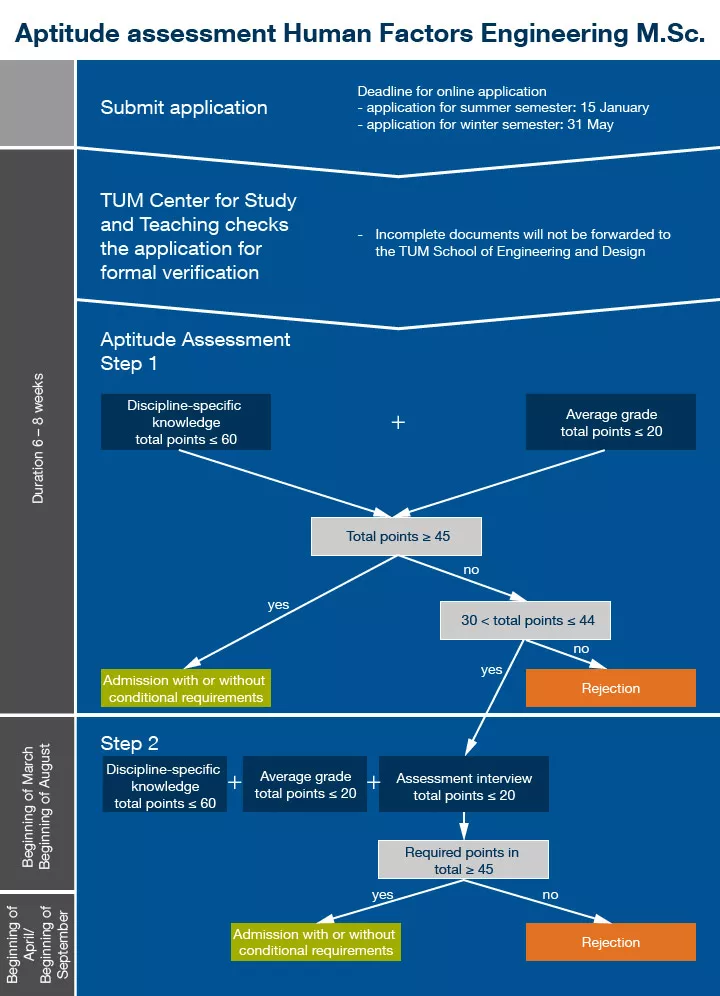Human Factors Engineering M. Sc.
Ready for a fascinating journey to the interface between human and technology? The Master's degree program in Human Factors Engineering at the TUM School of Engineering and Design offers a unique education that focuses on the development of user-orientated, sustainable technical systems and ethical justifiability.
Highly interdisciplinary and forward-looking: insights from engineering, computer science, psychology, medicine, design and health sciences are combined here. Students learn to design innovative technologies that are effective, efficient, user-friendly and socially acceptable.
The focus is primarily on engineering sciences, product design, biomechanics/digital human modeling and movement sciences. The course is characterized by a wide range of fields of application, particularly in the key areas of automotive, manufacturing, logistics and aviation.
What you'll learn for your future?
Technical systems are becoming more and more comprehensive and powerful. This makes the consistent alignment of technologies with the needs and abilities of the users even more necessary. Students on the Master's degree course in Human Factors Engineering learn to design technical systems, products and processes in such a way that they develop the greatest possible benefit for people.
Against the backdrop of globalization, digitalization and demographic change, this highly interdisciplinary course provides the necessary knowledge and skills to develop technical systems that support people effectively and efficiently, are easy to use, have no harmful effects and are as widely accepted by society as possible. Students can set individual priorities in the areas of biomechanical human modeling, human-centered systems engineering or human-machine interaction design.
Graduates of the course specialize in human-oriented technology development. They are able to design human-technology interfaces and thus living and professional worlds, industrial products as well as assistance, information and communication systems in such a way that they meet the needs of different user groups in the best possible way. They are therefore equally qualified to work in science and in a wide range of industries, particularly in the field of research and development.
More information on the M.Sc. Human Factors Engineering can be found on our TUM HFE Wiki.
Type of Study: Full Time
Standard Duration of Studies: 4 Semester
Credits: 120 ECTS
Main Locations: Garching
Admission Category: Aptitude Assessment for Master
Start of Degree Program: Summer and Winter Semester
Required Language Proficiency: English and German
Tuition Fees: for Students from Non-EU Countries
The scope of the work to be performed amounts to 120 ECTS, which are modular and are divided into 90 ECTS for modules (consisting of courses such as lectures, tutorials, seminars and internships) and 30 ECTS for the Master's thesis. 42 ECTS must be completed in compulsory modules and at least 30 ECTS in the elective area of "Subject Specialization". In addition, at least 10 ECTS must be completed in the elective area of the "Interdisciplinary Project" and at least 8 ECTS in the elective area "Interdisciplinary Supplement". Each semester should ideally comprise 30 ECTS credits.
In the first year of study, methodological foundations are set in the form of compulsory modules and modules to align the different qualification profiles. These can be extended by modules from the areas of "Subject Specialization" and "Interdisciplinary Supplementation".
There are three areas of specialization to choose from:
- Biomechanical modeling
- Human-machine interaction design
- Human-centered engineering
At least 20 credits must be earned in one specialization, which can be supplemented by 10 credits from another specialization. It is also possible to obtain at least 30 credits in only one specialization.
Students who cannot provide proof of modules in more than three of the specified subject groups at the time of admission must take a module from the elective area "Skills Enhancement", which is recommended by a mentor.
In the second year of study, further modules from the areas of "Specialization" and "Interdisciplinary Supplement" follow, as well as the "Interdisciplinary Project" and the Master's thesis.
The "Interdisciplinary Project" enables students to apply and deepen their knowledge through practice-oriented teamwork on real projects, such as the development, design and conceptualization of school furniture, a cockpit or an exoskeleton. Interdisciplinary collaboration strengthens important skills for the future working environment, including teamwork, project management, documentation and presentation skills.
During your Master's degree at TUM, you have the opportunity to study abroad for up to two semesters. For this purpose, it is advisable to take modules from the areas of "Specialization" or "Interdisciplinary Project" abroad. Other coursework completed abroad can also be recognized, as long as there are no significant differences to the modules offered in the degree program. The Master's thesis can also be completed at an international research institution.
Study visits abroad are possible, for example, via ERASMUS, with university cooperation partners of chairs, via TUMexchange and EuroTeQ and as internships.
Please apply through the TUMonline application portal and upload your application documents.
The qualification for the Master's degree program in Human Factors Engineering must be proven by a qualified Bachelor's degree (B. Sc.) of at least six semesters obtained at a German or foreign university or an at least equivalent degree in the fields of engineering, natural sciences, human sciences and design.
In addition, students who have achieved at least 140 credits in one of the above-mentioned Bachelor's degree programs (170 credits for a seven-semester Bachelor's or 200 credits for an eight-semester Bachelor's) can submit their transcript of records upon request instead of their Bachelor's certificate and diploma if they do not yet have the other two documents. The transcript of records must be certified by the responsible examination authority or the responsible Registrar's Office.
The Bachelor's degree certificate or equivalent proof must be submitted up to one year after the start of the Master's program.
Prospective students who have obtained their Master's entrance qualification (e.g. a Bachelor's degree) outside the EU/EEA must generally request preliminary examination documentation from uni-assist in advance.
You must provide sufficient knowledge of German and adequate knowledge of English language for this degree program. Information on the acceptable proof and the required language level can be found here.
If you are admitted, you must also submit a number of documents as certified paper copies for enrollment .
You can find more information about the application and the application documents on the Wiki and Master's degree programs at TUM.
Aptitude procedure
Admission to the Human Factors Engineering degree program is decided as part of a two-stage aptitude procedure. Detailed information on the aptitude procedure is documented in the FPSO for the M. Sc. Human Factors Engineering.
As part of the first stage of the suitability procedure, an assessment is carried out on the basis of the following criteria (max. 80 points possible):
- Subject qualification (max. 60 points)
You must have passed module examinations with at least 4 credits in at least three of the following six subject groups:Research Methodology, Mechanics, Design, Mathematical Foundations, Fundamentals of Programming, Fundamentals of Cognitive Science. - Grade (max. 20 points)
For each tenth of a grade that the average calculated over examinations amounting to 140 credits is better than 3.0, one point is awarded.
Students who have achieved at least 45 points are admitted directly. If you score less than 30 points, you will be rejected directly. Those who fall between the two limits must go through the second stage of the aptitude procedure.
As part of the second stage of the aptitude test, applicants are invited to a selection interview lasting approximately 20 minutes. The final suitability of the applicant is determined by the grade and professional qualifications as well as the result of the selection interview.

